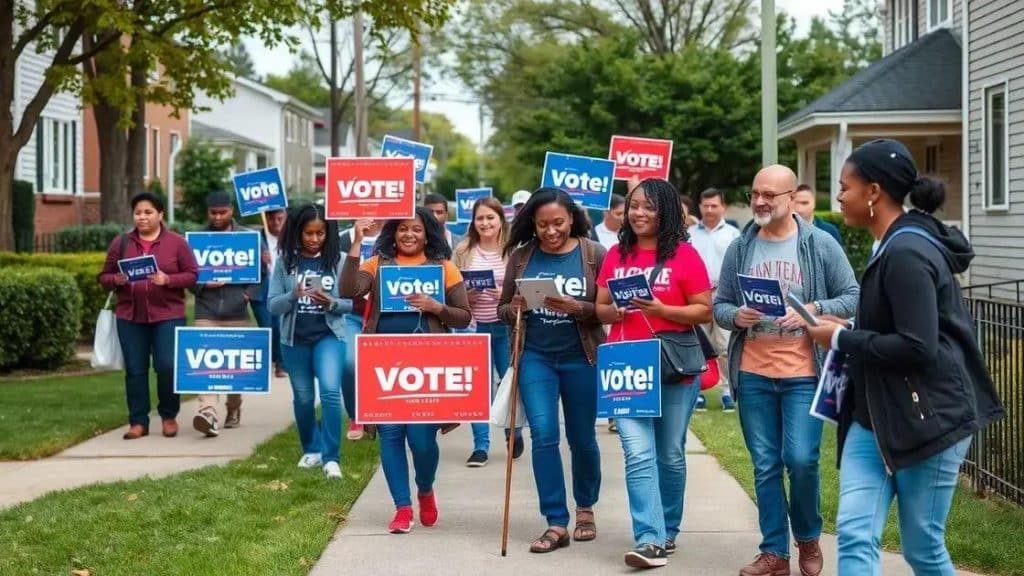Power political campaign focus: strategies that win

The success of political campaigns relies on effective strategies like social media engagement, adaptability, and data analytics to connect with voters and enhance campaign performance.
Power political campaign focus determines the very essence of election success. Have you ever wondered what makes one campaign stand out from the rest? Let’s dive into the crucial strategies that can amplify your political efforts.
Understanding the power of political campaigns
Political campaigns hold immense power in shaping public opinion and deciding elections. Understanding this power can offer insights into what makes campaigns effective.
One crucial aspect is the ability to craft a compelling narrative. A strong story can resonate with voters and create a connection that numbers alone cannot achieve. Campaigns that share relatable experiences often capture the attention and hearts of their audience.
Key Elements of a Successful Campaign
To leverage the power of political campaigns effectively, several elements must be considered:
- Clear Messaging: Articulating a consistent and relatable message is vital. Voters need to understand what the candidate stands for.
- Voter Engagement: Campaigns should focus on interacting with voters, utilizing social media and community events to create a connection.
- Data-Driven Strategies: Analyzing data helps in understanding voter preferences and targeting specific demographics effectively.
- Visual Identity: A strong visual representation of the campaign can enhance recall and attachment among voters.
Moreover, the power of a campaign is amplified through its adaptability. Successful campaigns continuously refine their strategies based on feedback and evolving circumstances. This dynamic approach allows them to maintain relevance and impact in a rapidly changing political landscape.
In today’s world, technological advancements have transformed how campaigns function. Social media platforms provide valuable tools for outreach and engagement, enabling campaigns to reach targeted audiences with tailored messages. The influence of social media cannot be overstated; it has become a critical battleground for public opinion.
Key strategies for a successful campaign
To run an effective political campaign, it’s crucial to implement solid strategies. Understanding these key strategies can enhance the chances of success significantly.
Defining Your Target Audience
The first step is to define your target audience. Knowing who you want to reach helps in formulating messages that resonate. This can include demographic factors like age, location, and interests. Tailoring your campaign efforts to meet the needs of your target demographic ensures your message is impactful.
Building a Strong Brand
Every successful campaign has a strong brand. This includes creating a recognizable logo, a consistent color scheme, and a coherent message. A strong brand creates a sense of trust and familiarity among voters, making them more likely to support you.
- Visual Identity: Your campaign’s visual identity is vital for recognition.
- Consistent Messaging: Keep messages clear and consistent across all platforms.
- Engagement: Engage voters through relatable content and interactive events.
Another important strategy involves leveraging social media. Today, many voters get their news from social media platforms, making it essential to maintain an active presence. By sharing updates, engaging with followers, and responding to comments, candidates can strengthen their connections with supporters.
Additionally, grassroots organizing plays an essential role in building a campaign. Mobilizing volunteers and supporters can create a powerful network. These grassroots movements help in spreading the word through personal connections, building a stronger message organically.
Incorporating data analytics into your campaign strategy can significantly enhance voter targeting. By analyzing data from past elections and current trends, campaigns can develop targeted advertising strategies that reach individuals more likely to support them.
How to engage voters effectively

Engaging voters effectively is crucial for a successful political campaign. Establishing a personal connection with the electorate fosters trust and enthusiasm.
Utilizing Social Media
One of the most effective ways to engage voters is through social media. Platforms like Facebook, Twitter, and Instagram allow campaigns to reach a broader audience quickly. Candidates can share updates, innovative ideas, and personal stories that resonate with potential voters.
- Interactive Content: Hosting live Q&A sessions invites voters to ask questions directly.
- Share Personal Stories: Sharing experiences helps voters feel a connection with the candidate.
- Regular Updates: Posting consistently keeps voters informed and engaged.
Another approach is organizing community events. Town halls, meet-and-greets, and forums enable candidates to meet voters in person. These gatherings create an opportunity for face-to-face interaction, allowing voters to express their concerns and opinions directly.
Mobilizing Volunteers
Mobilizing volunteers is also vital for engaging voters. Volunteers can assist in canvassing neighborhoods and phone banking. They act as ambassadors for the campaign, helping spread the message and motivate others to participate. Engaging volunteers not only amplifies outreach efforts but also involves them in the democratic process.
Moreover, personalized outreach can have a significant impact. Sending personalized messages or phone calls to voters can make them feel valued. Highlighting specific issues that matter to them demonstrates genuine interest and can lead to increased support.
Using data analytics effectively can enhance outreach efforts. Campaigns can identify key voter demographics and tailor messages directly towards them. Understanding what issues resonate with different groups of voters allows campaigns to develop targeted strategies that drive engagement.
The role of social media in campaigns
Social media plays a significant role in modern political campaigns. It provides a platform for candidates to connect with voters and share their messages effectively.
Building Online Presence
Establishing a strong online presence is crucial. Candidates can showcase their platforms through posts and videos that emotionally resonate with the audience. Using social media allows campaigns to appear more accessible and relatable to voters.
- Authenticity: Sharing personal stories helps candidates appear genuine.
- Engagement: Actively responding to comments builds a connection with followers.
- Regular Updates: Keeping the audience informed maintains interest and excitement.
Moreover, social media serves as an excellent tool for targeted advertising. Campaigns can use demographic data to deliver customized messages to specific voter groups. This leads to higher engagement rates and maximizes outreach efficiency.
Creating Viral Content
Creating engaging and shareable content can help boost visibility. When posts resonate with followers, they are more likely to share them with their networks, amplifying the campaign’s reach. Viral content can include memes, inspirational quotes, or short, impactful videos that highlight the candidate’s message.
Additionally, social media facilitates real-time interaction. Candidates can host live events, such as Q&As or town halls, where they address voter concerns directly. This immediate feedback loop fosters trust and creates a more interactive experience for voters.
Tracking engagement analytics helps campaigns understand what content performs best. By analyzing likes, shares, and comments, teams can refine their strategies to focus on what resonates most with their audience. This adjustment is vital for maintaining an effective presence on social media platforms.
Measuring campaign success and adaptations
Measuring campaign success is vital for understanding what works and what doesn’t. By analyzing results, campaigns can adapt to changing circumstances and improve their strategies.
Key Performance Indicators (KPIs)
Establishing clear key performance indicators (KPIs) helps in assessing campaign effectiveness. Common KPIs include voter turnout, online engagement rates, and media coverage. Tracking these metrics over time offers insights into which aspects of the campaign resonate.
- Voter Turnout: Comparing turnout rates against previous elections can indicate success.
- Engagement Rates: Likes, shares, and comments on social media reflect voter interest.
- Media Mentions: Analyzing how often the campaign is mentioned in news articles indicates visibility.
In addition to KPIs, conducting surveys post-election can gather qualitative feedback. Ask voters about their experiences and what influenced their choices. This feedback loop creates opportunities for improvement and innovation in future campaigns.
Adapting Strategies
Adaptability is crucial during a campaign. If certain strategies aren’t producing desired results, campaigns must be willing to pivot. Regularly reviewing analytics helps teams recognize trends and adjust messaging or outreach methods accordingly.
Incorporating data analytics tools can automate this process. By utilizing software that tracks voter behavior and campaign performance, teams can make data-driven decisions quickly. This approach ensures that resources are allocated effectively and helps keep the campaign agile.
Finally, maintaining open lines of communication within the campaign team enhances adaptability. Regular meetings to discuss performance, successes, and challenges foster collaboration and enable efficient responses to issues as they arise.
FAQ – Frequently Asked Questions about Political Campaign Strategies
What are key performance indicators (KPIs) in campaigns?
KPIs are measurable values that indicate how effectively a campaign is achieving its objectives, such as voter turnout and engagement rates.
How can social media impact a campaign?
Social media allows candidates to connect with voters, share their messages, and engage with the community, significantly boosting visibility and interaction.
Why is adaptability important in a political campaign?
Adaptability allows campaigns to modify strategies based on feedback and data, helping them respond to voter needs and changing circumstances effectively.
How can data analytics improve campaign success?
Data analytics provides insights into voter behavior and preferences, enabling campaigns to tailor messages and strategies for better engagement and results.





